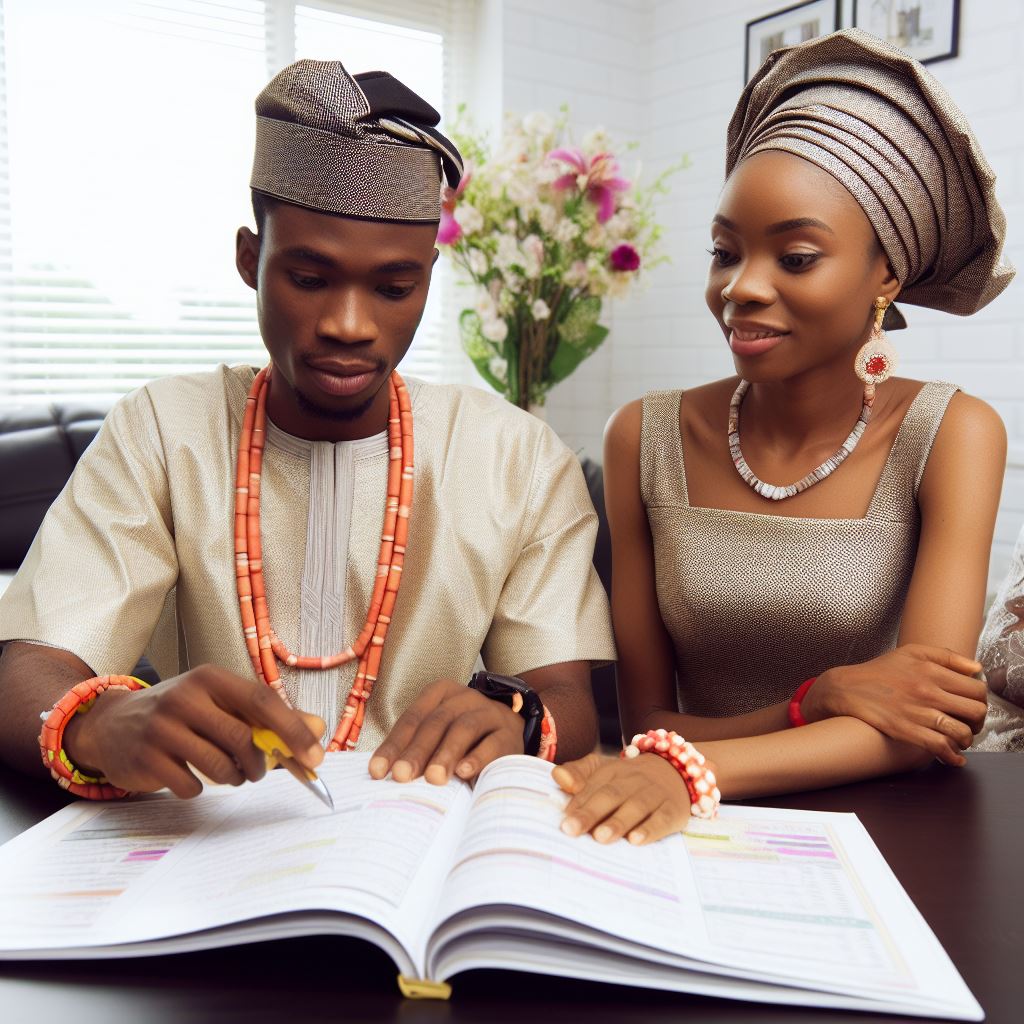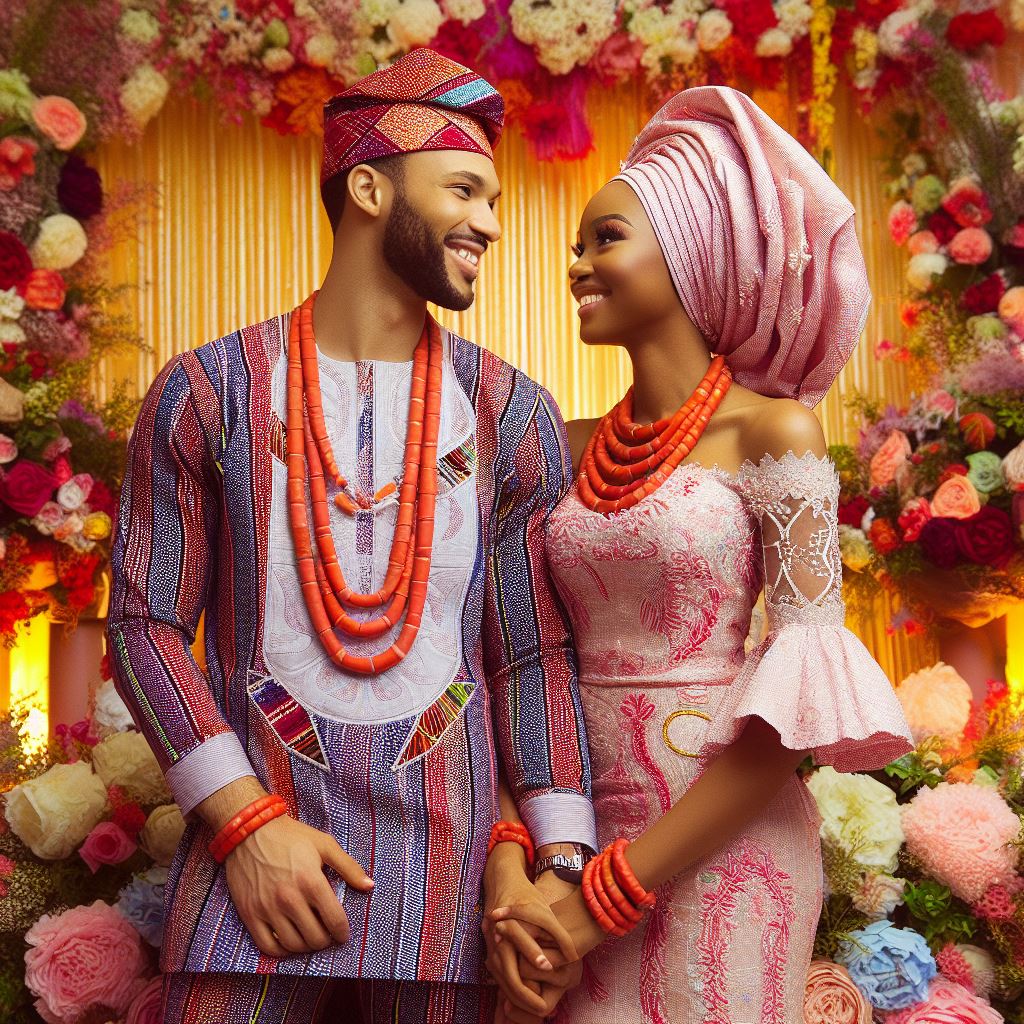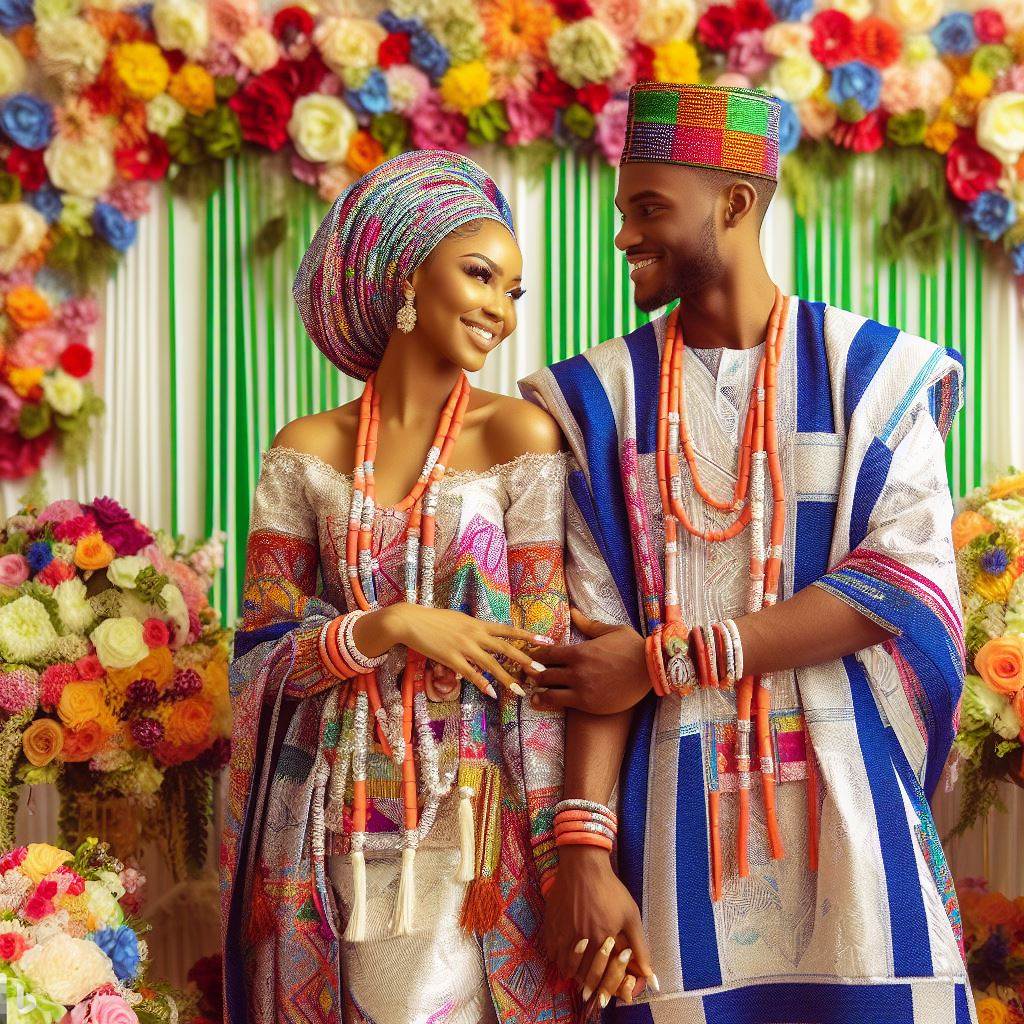Introduction
The Nigerian Marriage Registry is a topic of significant importance and common queries.
Let’s dive in.
Significance
- The Nigerian Marriage Registry is the official channel for legalizing marriages in the country.
- It provides legal recognition and protection to couples.
- The registry helps resolve legal disputes regarding marital status and property rights.
- It’s essential for spousal visa applications and ensures inheritance rights?
Common Queries
- How do I register my marriage in Nigeria?
- What are the required documents for marriage registration?
- Can foreigners marry in Nigeria?
- Is there a waiting period for registration?
- What’s the cost associated with the process?
- How long does it take to obtain a marriage certificate?
- What’s the difference between customary and statutory marriages?
- Are there age restrictions for marriage registration?
- Can a person be married to more than one spouse in Nigeria?
- How can a marriage be dissolved legally?
In this blog section, we’ll address these FAQs and provide clarity on the Nigerian Marriage Registry.
What is the Nigerian Marriage Registry?
In Nigeria, the Nigerian Marriage Registry refers to the government agency responsible for the registration and documentation of marriages in the country.
It serves as the official record-keeping body for all legal marriages.
Definition and Explanation
- The Nigerian Marriage Registry is an institution that facilitates the legal recognition and documentation of marriages in Nigeria.
- It is a government agency that operates under the Ministry of Internal Affairs and is responsible for maintaining an accurate registry of all marriages conducted within the country.
- The Nigerian legal system considers it an essential component, also known as the Registry of Marriages.
- The Nigerian Marriage Registry mandates that couples must register their union for legal recognition under Nigerian law.
- The registry provides an official certificate of marriage, which serves as proof of the legally recognized union.
Legal Implications and Relevance
- The Nigerian Marriage Registry plays a crucial role in ensuring the legal recognition and protection of marriages in Nigeria.
- By registering a marriage at the Nigerian Marriage Registry, couples gain legal rights and benefits that are only applicable to legally recognized unions.
- These rights and benefits include inheritance rights, access to social security schemes, tax benefits, and legal protections in case of separation or divorce.
- In addition, registering a marriage at the Nigerian Marriage Registry offers greater security and clarity in case of any legal disputes or challenges to the marriage’s validity.
- A centralized database accessible through the registry aids in preventing bigamy and verifying individuals’ marital status, deterring illegal or fraudulent marriages.
- The Nigerian marriage registry also serves as a reliable source of statistics and data for the government and other institutions.
- It aids in the collection of accurate demographic information, analysis of marriage trends, and implementation of social policies.
- The registry actively ensures the recognition and documentation of women’s marriages, safeguarding their rights.
- It facilitates the enforcement of laws related to dowry, domestic violence, and other issues that may arise within the institution of marriage.
- In summary, the Nigerian Marriage Registry holds significant legal implications and relevance in Nigerian marriages, providing couples with legal recognition, rights, and protections, and aiding the government in policy-making and data collection.
Couples can secure legal recognition for their marriage and access Nigerian legal benefits and protections by comprehending the role and significance of the Nigerian Marriage Registry.
Read: Marriage Fraud vs Genuine Relationships in Nigeria
Types of Marriages Recognized by the Nigerian Marriage Registry
Interfaith Marriages
- Interfaith marriages are recognized by the Nigerian Marriage Registry.
- Both partners should provide a letter of consent from their religious leaders.
- The couple needs to submit an affidavit stating their commitment to respecting each other’s religious beliefs.
Traditional Marriages
- Traditional marriages are also recognized by the Nigerian Marriage Registry.
- The couple must present a letter of consent from the traditional ruler of their community.
- The marriage ceremony should follow the customs and traditions of the community.
Civil Marriages
- The Nigerian Marriage Registry also recognizes civil marriages.
- The couple needs to obtain a marriage license from the registry.
- The ceremony must be conducted by an accredited marriage registrar.
Customary Marriages
- Local customs and traditions are pivotal in recognizing customary marriages, as long as they adhere to them.
- Both partners must submit a letter of consent from their respective families.
- The couple should register the marriage with the appropriate court or registry.
Muslim Marriages
- Muslim marriages are recognized by the Nigerian Marriage Registry.
- The couple needs to obtain a marriage license from the registry.
- A recognized Islamic marriage registrar should conduct the ceremony following Islamic marriage rites.
Court Marriages
- Court marriages are also recognized by the Nigerian Marriage Registry.
- The couple should file a notice at the registry and wait for the required waiting period.
- The registrar and witnesses will conduct the ceremony.
Proxy Marriages
- Proxy marriages are recognized under certain circumstances.
- If one partner cannot attend the ceremony, a proxy can represent them.
- The absent partner must provide a power of attorney and necessary documentation.
Special Marriages
- The law recognizes special marriages for individuals facing exceptional circumstances.
- These include marriages involving individuals with disabilities or severe illness.
- The registry may require additional documentation or procedures for special marriages.
Age Restrictions
- The Nigerian Marriage Registry has age restrictions for certain types of marriages.
- Both partners must be at least 18 years old for civil and court marriages.
- Traditional and customary marriages may have different age requirements, depending on local customs.
Marriage Registration
- Every couple, regardless of their marriage type, must register their marriages.
- The registration should take place at the appropriate court or marriage registry.
- The couple needs to provide necessary documentation and pay the required fees.
In fact, the Nigerian Marriage Registry recognizes various types of marriages, including interfaith, traditional, civil, customary, Muslim, court, proxy, and special marriages.
Each type has specific requirements and procedures, such as obtaining a marriage license, submitting letters of consent, following religious customs, or filing a notice at the registry.
Age restrictions also apply, and couples need to register their marriages with the appropriate court or registry.
By understanding these different types of marriages, individuals can ensure they fulfill the necessary obligations when planning their wedding in Nigeria.
Read: Protecting Your Rights in a Marriage-Based Citizenship Bid

Frequently Asked Questions (FAQs) on Nigerian Marriage Registry
Answer common queries related to the registration process
What documents are required for marriage registration?
- Original and valid international passports or national identity cards of both partners.
- Valid birth certificates of both partners.
- Sworn affidavit of single status for both partners.
- Payment of registration fees.
- Four passport-sized photographs of each partner.
- How long does the registration process usually take?
The registration process typically takes around 2 to 4 weeks, depending on various factors such as document verification and workload at the registry. - Can foreigners marry in Nigeria through the registry?
Yes, foreigners can marry in Nigeria through the marriage registry.
However, they must provide additional documents like a certificate of no impediment from their home country and valid visas. - Is there a specific age requirement for marriage registration?
Yes, there is a specific age requirement for marriage registration in Nigeria.
Both partners must attain a minimum age of 21 years, or if minors, they need parental or guardian consent. - What happens if one or both partners have been previously married?
Partners with prior marriages must furnish proof of their dissolution through divorce or death certificates of former spouses.
Common queries regarding the ceremony at the registry
- Is a religious ceremony required after the registration?
After the marriage registration, there is no requirement for a religious ceremony.
However, couples can choose to have a separate religious ceremony if they wish to do so - Can couples have a wedding reception after the registry marriage?
Yes, couples can have a wedding reception after the registry marriage. It is a personal choice and not mandatory. - Are witnesses necessary for the registration process?
Witnessing the marriage registration necessitates two individuals aged 18 or above with valid identification documents. - Can same-sex couples register their marriage in Nigeria?
No, same-sex marriage is not legally recognized in Nigeria.
The marriage registry only allows the registration of marriages between a man and a woman. - Can couples from different religious backgrounds register their marriage?
Yes, couples from different religious backgrounds can register their marriage at the Nigerian marriage registry.
The registry is secular and does not discriminate based on religion.
Answers to common queries about the legal and validity aspects
- Is a marriage certificate obtained from the registry legally binding?
Yes, a marriage certificate obtained from the Nigerian registry is legally binding and recognized as evidence of legal marriage. - Can a registry marriage be considered as a valid marriage for visa purposes?
For visa purposes, a registry marriage in Nigeria holds the status of a valid marriage.
You can use it to sponsor a spouse or include them in immigration applications. - Are there any restrictions on interfaith marriages through the registry?
There are no specific restrictions on interfaith marriages through the registry.
Couples are free to register their marriage regardless of their religious background. - Do couples need to renew their marriage certificate after a certain period?
No, couples do not need to renew their marriage certificate after a certain period.
Once obtained, the marriage certificate remains valid throughout the couple’s lifetime. - Can couples register their marriage in Nigeria if they reside outside the country?
Yes, couples who reside outside Nigeria can still register their marriage in Nigeria by appointing a trusted representative to submit the required documents on their behalf.
In essence, the Nigerian marriage registry provides a straightforward and legally recognized process for couples to register their marriage.
By fulfilling the necessary requirements and following the registration process, couples can obtain a valid marriage certificate that holds legal significance both in Nigeria and abroad.
Read: Comparing Routes: Citizenship by Birth, Descent, & Marriage
Benefits and Limitations of the Nigerian Marriage Registry
Advantages of Registering a Marriage through the Registry
- Legal recognition: Registering your marriage at the Nigerian Marriage Registry provides legal recognition of your union.
- Proof of marriage: The marriage certificate issued by the registry serves as official documentation of your marital status.
- Protection of rights: Registering your marriage ensures that your rights and responsibilities as a spouse are protected.
- Access to benefits: A registered marriage entitles couples to various benefits, such as social security, healthcare, and pension schemes.
- Recognition in court: Registered marriages are recognized in court, making it easier to resolve legal matters if the need arises.
- Immigration purposes: A registered marriage is often a requirement for visa applications or for sponsoring a spouse’s immigration status.
- Legitimate children: The registry provides legal recognition for children born within the registered marriage.
- Establishing inheritance rights: Registered marriages ensure that spouses have the right to inherit each other’s property.
- Peace of mind: Registering your marriage brings peace of mind, knowing that your union is recognized and protected by law.
- Formal acknowledgment: Registering a marriage publicly acknowledges the commitment between two individuals.
Limitations or Challenges Individuals May Face
- Religious or cultural constraints: Some individuals may face opposition or constraints due to religious or cultural beliefs against civil marriages.
- Additional costs: Registering a marriage requires fees, and the overall cost can be a limitation for some couples.
- Administration process: The paperwork and administrative process involved in registering a marriage can be time-consuming and tedious.
- Geographical limitations: Couples residing in remote areas may face challenges in accessing a marriage registry or registrar’s office.
- Language barriers: Language barriers may create difficulties for individuals who are not fluent in English, the official language for marriage registration in Nigeria.
- Reluctance to disclose personal information: Some individuals may be hesitant to disclose personal details required for marriage registration, such as age or previous marital status.
- Changes in circumstances: Registering a marriage legally binds the couple, making future separation or divorce a more complicated process.
- Doubts or uncertainty: Some individuals may have reservations or doubts about the effectiveness or legitimacy of the marriage registry.
- Limited societal acceptance: Some communities may not widely accept or value civil marriages as much as traditional or religious ceremonies.
- Lack of awareness: Limited knowledge about the benefits and process of registering a marriage may lead to a lack of utilization of the registry.
In general, registering a marriage through the Nigerian Marriage Registry offers numerous advantages, including legal recognition, access to benefits, and protection of rights.
However, individuals may face limitations or challenges such as religious or cultural constraints, additional costs, and administrative processes.
It is essential for couples to weigh these factors and make an informed decision that best suits their circumstances and preferences.
Read: Popular Nigerian Songs to Play During Your Marriage Proposal
How to Register a Marriage at the Nigerian Marriage Registry
Step-by-step guide on registering a marriage
Preparing the required documents
Before heading to the Nigerian Marriage Registry, gather the necessary documents for registration.
These typically include:
- Proof of age for both parties (e.g. birth certificates or passports)
- Valid identification cards (e.g. national ID cards or driver’s licenses)
- Passports or travel documents of both parties
- Proof of marital status (e.g. divorce certificate or death certificate for widows/widowers)
- Four (4) passport-sized photographs of each party
- Any other relevant documents as required by the registry
Booking an appointment at the registry office
Next, contact the Nigerian Marriage Registry office to schedule an appointment for registration.
This can usually be done via phone or in person.
- Locate the nearest registry office in your area
- Call the office or visit in person to book an appointment
- Provide your preferred date and time for the registration
- Confirm all the necessary details with the registry officer
Attending the registration appointment
Arrive at the Nigerian Marriage Registry office on the scheduled date and time of your appointment.
- Ensure both parties are present with the required documents
- Be punctual and arrive at least 15 minutes before the appointment
- Inform the registry officer about your arrival
- Be prepared for any additional questions or required information, and wait for your turn.
Completing the necessary paperwork
A registration appointment will guide you in completing the necessary paperwork.
- Provide accurate and honest information as requested
- Fill out the marriage registration form provided by the registry
- Double-check all the information before signing the document
- Ask for clarification if there is any confusion or uncertainty
- Submit the completed paperwork and necessary documents to the registry officer
Payment of registration fees
Once you finish the paperwork, you must pay the registration fees.
- Ask the registry officer about the payment methods accepted
- Prepare the required amount in cash or any specified payment method
- Obtain the receipt for the registration fees
Issuance of marriage certificate
Once all the necessary steps are completed, you will receive your marriage certificate.
- The certificate will be issued by the Nigerian Marriage Registry
- Verify all the details on the certificate for accuracy
- Keep the marriage certificate safe and secure for future use
By following these step-by-step instructions, you can successfully register your marriage at the Nigerian Marriage Registry.
Remember, it is essential to provide all the required documents, attend the appointment on time, and accurately complete the necessary paperwork.
Congratulations on your upcoming marriage!
Conclusion
In this blog section, we’ve addressed common queries about the Nigerian Marriage Registry:
- Understanding the importance of the marriage registry.
- The legal requirements and documents for marriage registration.
- The process and timeline for registering your marriage.
- The differences between customary and statutory marriages.
- The benefits of registering your marriage in Nigeria.
- How to rectify errors in marriage certificates.
- Tips for a smooth marriage registration process.
If you’re planning to tie the knot, seeking professional advice from a legal expert or the Nigerian Marriage Registry officials is essential.
The information in this blog is a helpful starting point, but personalized guidance is crucial for a seamless and legally sound marriage registration experience.
Your journey toward a happily ever after starts with proper registration, so don’t hesitate to reach out for expert assistance. Best wishes on your marital adventure!




